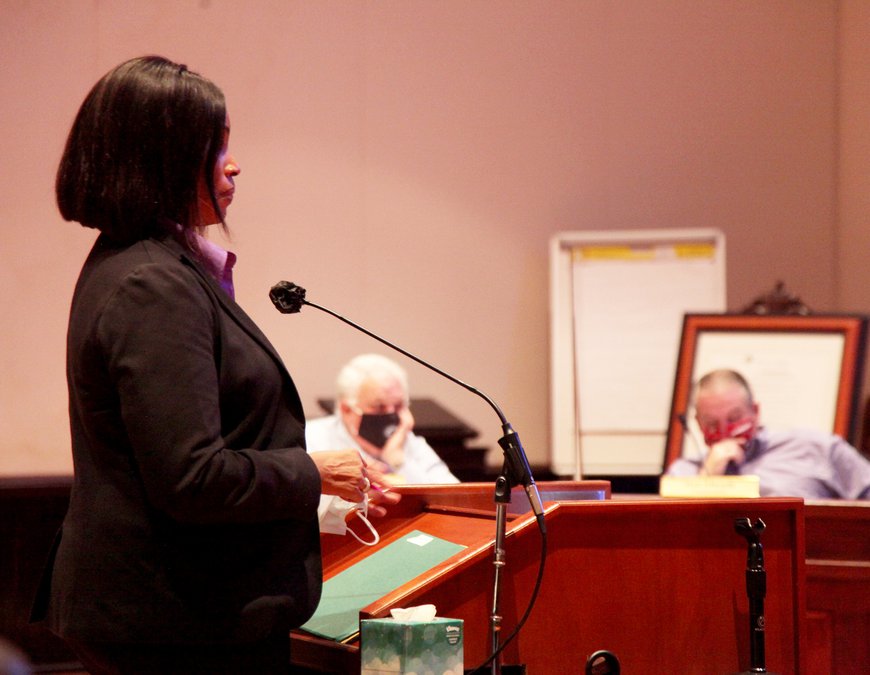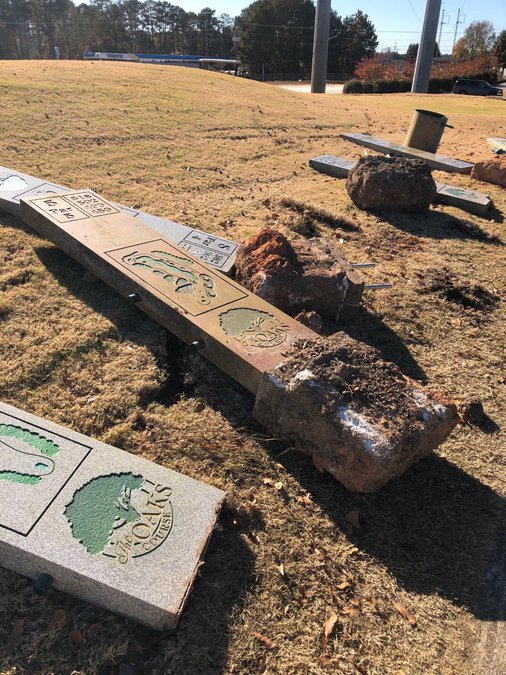No. 6 — P-Cards: Investigation underway after questions of abuse arise in Newton
By Taylor Beck | tbeck@covnews.com
COVINGTON, Ga. — In August, District Attorney Randy McGinley requested state authorities investigate “certain” Newton County purchasing card (P-card) records.
After he received copies of “certain” P-card records, McGinley told The Covington News he met with “a state law enforcement agency about certain records and requested an investigation into certain transactions.” He said the records would include “certain P-card holder’s records covering 2020 and further back.”
“The records I have go into some of 2021, but I am not sure if they go all the way through June of this year,” McGinley said. “But, if I need to get more recent records, I can easily do so.
“If this necessitates further action, then my office will do so,” he added. “It is not appropriate for me to comment beyond that at this point.”
Bound by Georgia Rules of Professional Conduct, Rule 3.8, McGinley said he could not make any public comment that would “have a substantial likelihood of heightening public condemnation” of anyone accused of a crime.
“There are times when I will tell everyone that it would not be appropriate for me to comment on whether there is even an ongoing investigation,” he said. “However, in circumstances where it is already publicly known, including by potential parties being investigated, there is not much purpose served by me not at least confirming that there is an investigation.”
Who or how many of Newton County’s 50 P-card users could be investigated is unknown.
The district attorney said initial contact with state authorities was made prior to The Covington News series on P-cards, which began in late July. Within the series, The News has explained what P-cards are and analyzed the spending records of P-card holders dated June 2020-June 2021.
The District Attorney’s Office handles all state criminal offenses in Newton County, but McGinley said the “vast majority” of cases come to the office after an arrest is made.
“While we are the prosecuting agency, we are rarely the initiating investigative agency,” McGinley said. “However, that does not mean my office cannot and will not investigate matters when it is just not being done by a local law enforcement agency. We have done so and will continue to do so when necessary.”
RESIDENTS DEMAND CHANGE
When The Covington News published a four-part series on P-Cards across four weekend issues starting in late July and ending early August, residents saw the P-card policy and procedures, were presented past spending records and even heard from Newton County Chairman Marcello Banes and County Manager Lloyd Kerr on the subject of spending.
Not only did residents want an investigation into the county’s spending records, but many called for major change to the P-card program.
Many residents also requested a “full, forensic” audit to be conducted.
McGinley told The Covington News that his office had no control or authority to be involved in a decision to revoke P-cards or abolishing the program altogether, as some residents had suggested, and an audit can be conducted by the county, which could then be outsourced to an outside firm or business.
“[To clarify,] I am responsible for the ethical behavior and fiscal responsibility of my department, not any other department,” McGinley said. “My office is not a fiscal responsibility watchdog. Now, clearly, when there is criminal activity, it is usually unethical and can be a breach of a fiduciary obligation. But if it is determined that something is not criminal or that we cannot prove criminal activity beyond a reasonable doubt, it is not appropriate for my office to decide whether it is ethical or fiscally responsible.
“Personally, I believe that tight control, a strong written and clear policy, and regular review of expenses is a better way to address concerns with P-cards than outright abolishing them,” he said.
The county’s current policy states, “The Cardholder shall use the Purchasing Card for legitimate business purposes only. The Purchasing Card shall not be used for entertainment, cash, or personal use.” However, there is no further explanation or definition as to what is “necessary” or what is a “legitimate business purpose.” There are also no examples or guidelines as to what would be prohibited uses of a P-card, other than it cannot be used for “entertainment, cash, or personal use.” McGinley said many other entities, including the State of Georgia, have a more detailed policy, which includes examples and further defines terms in the policy.
Any proposed changes made by residents could be hard to come by, unless a majority of the governing Board of Commissioners can be convinced a change is necessary. Only the commissioners hold the power to make changes to the policy, as it was the commissioners who originally enacted the framework in 2013.
At last report in November, McGinley said the GBI was still investigating potential P-Card misconduct.


No. 7 — Newton County's embattled coroner resigns after five months in office
By Tom Spigolon | tspigolon@covnews.com
COVINGTON, Ga. — The office of coroner in Georgia often can be a low-profile position despite it requiring investigation of a number of types of odd or suspicious deaths.
Dorothea Bailey-Butts went against the grain in 2021 in Newton County after defeating three-term incumbent Tommy Davis in November 2020.
Davis, a Republican and a funeral home owner, was seeking a fourth consecutive term in the job after his first election in 2008.
Bailey-Butts, a Democrat and a registered nurse, had lost a bid for the office to Davis in 2016. She won in 2020 with 2,000 more votes in a year Democrats won a majority of the county's votes in all contested elections for countywide seats.
Bailey-Butts became the first African-American to hold the position in Newton County after taking office Jan. 1.
In a January presentation to the Newton County Board of Commissioners, Bailey-Butts spoke about the need for funding of equipment, training and new office space for the job.
She said she was the first person who was not a mortician to hold the office in decades and others before her often used facilities available at their funeral homes.
The Board later approved a $50,000 amendment to the coroner's budget for supplies and training.
However, during the same presentation, she also showed commissioners an envelope she said contained damaging information — an implication she would disclose the information if she did not receive more funding.
She declined to answer reporters' questions about its purpose and said the information was not subject to Georgia's open records law because it was her personal property.
TV news stations later ran a video of her refusing to transport a body from a wreck scene — an action previous coroners reportedly typically had done.
In February, County Manager Lloyd Kerr took the unusual step of requesting the Georgia Coroner's Training Council to take action against Bailey-Butts because of a series of allegations made against her about her job performance which began soon after she took office in January — including improper removal of a suicide victim which she later denied.
State officials ultimately said they could not take action because she had not received a state coroners training course at the time the events allegedly occurred.
After a period of time in which the county commission approved remodeling part of a county building for use as office space and records storage, Bailey-Butts announced in a May 25 posting on her Facebook page she was resigning the job.
She said, "There were too many scandals and issues about how I do my duties which mainly comes from the fact that I am Black" and "there were even issues with my office space, my deputies, and other stuff which weren’t a problem with the previous coroner.”
The county government responded it “worked with Bailey-Butts to ensure the needs of the residents of Newton County were met.”
It also said the coroner was "in the process of moving to a larger office to accommodate the needs she expressed" and "firmly denies any claims of lack of support to the coroner’s office and any allegations of discrimination based on gender or race.”
A Wednesday, May 26, order signed by Probate Judge Melanie Bell was based on a letter of resignation from Bailey-Butts dated the same day, according to information from the county government. In the same order, Bell appointed Davis to fill the vacancy.
However, a posting on her Facebook page May 26 said Bailey-Butts announced she was rescinding the resignation she gave the day before. She told a reporter on Atlanta TV station Fox 5 she decided to withdraw the resignation after being interviewed by the station.
She then posted on her Facebook page: "PSA..... I have decided that I am not going to resign as Newton County Coroner. I am withdrawing my resignation effectively today. I am not resigning from my position. The citizens voted me in this position.
"I apologize for the inconvenience."
Gov. Brian Kemp, though, told Bailey-Butts in a May 27 letter he had been “apprised of your resignation, effective 8:00 a.m. on May 28, 2021” and thanked her, effectively ending her service.
“Your resignation as coroner is hereby accepted, and I wish you all the best,” Kemp wrote.
The Newton County Board of Elections later in the year received information that state law required the Probate Judge to appoint someone to serve the remainder of the coroner's term if a vacancy occurs — which placed Davis in the coroner's office through 2024.


No. 8 — County government seeks new manager after Board of Commissioners dumps Kerr
By Tom Spigolon | tspigolon@covnews.com
COVINGTON, Ga. — By year’s end, Newton County government was seeking a new manager after the Board of Commissioners in early November narrowly voted not to renew Lloyd Kerr’s contract after six years in the position.
The county manager oversees the day-to-day operations of the county government and is responsible for presenting the annual budget to the Board, among other duties.
Kerr had served as county manager since 2016 and the Board voted unanimously to renew his contract for an additional three years in early 2019.
However, in 2021, Kerr and some commissioners began clashing publicly on some issues that apparently led to the action not to renew his contract.
In February, Kerr took the unusual action of requesting a state board to remove then-Coroner Dorothea Bailey-Butts from office because of a series of allegations made against her about her job performance which began soon after she took office in January.
State officials ultimately said they could not take action because she had not received a state coroners training course.
Kerr also publicly complained that some Board members were violating the county charter by bypassing him and directly contacting county employees — which rankled some commissioners who complained that delays in communicating with Kerr often led to the need for direct communication with employees.
In addition, the county received $10.8 million in COVID-19 relief funds in May from the federal American Rescue Plan Act of 2021.
Kerr subsequently maintained that the county government had not received final instructions on how to distribute the money and risked being liable for any funds not spent properly.
By the fall, some commissioners and a state lawmaker publicly complained that Kerr was not working hard enough to find a way to distribute the funding.
The Board of Commissioners voted 3-2 in early November not to renew Kerr’s contract after one commissioner publicly complained about Kerr’s apparent uncaring attitude toward residents in need of federal rental assistance, among other issues.
Chairman Marcello Banes said he planned to veto the action in an effort to keep Kerr in the position because of his part in upgrading the government’s financial standing since 2016. But County Attorney Patrick Jaugstetter told commissioners that Banes’ action would not overrule state law that requires a governing body’s majority vote to renew a contract.
The Board then met again Nov. 23 and Banes recommended they keep Kerr in the position for a year to allow for a transition period.
District 4 Commissioner J.C. Henderson sought to appoint former county recreation director Ternard Turner as interim county manager. Commissioners voted 3-2 against hiring Turner after hearing Jaugstetter say he believed the action was not in line with the county government’s operating charter that requires the chairman to submit a list of candidates from which Board members would fill the position.
Commissioners ultimately formed a committee to determine how the federal COVID-19 relief funds could be distributed and were working on a plan at year’s end.
Meanwhile, the county government posted the position of interim county manager Nov. 29 on its website and set a Dec. 29 deadline to apply. Board members had said they wanted someone to serve in the job for about six months until someone could be found to fill it on a permanent basis.
The county’s operating charter, also known as the enabling legislation, states the chairman must provide at least three “qualified” candidates to the Board “provided sufficient applications are received.”
If fewer than three candidates are submitted, the Board can choose to appoint someone or request more candidates be found.
Kerr worked as a planning official in Fayetteville, Newton County, Covington and Pensacola, Florida.
He was promoted from Newton’s planning director to interim county manager in January 2016 and was named to the permanent position in August 2016.


No. 9 — Oaks Golf Course closes after 32 historic years
By Taylor Beck | tbeck@covnews.com
PORTERDALE, Ga. — Arguably Newton County’s most historic golf course closed in November.
The Oaks Golf Course had been in operation for 32 years, but the site had been home to a golf course for more than nine decades.
Formerly home to two dairies, Bibb Manufacturing Co. first developed the land along the Yellow River as a nine-hole golf course for its employees in the 1930s. One of the course designers was said to be early golf legend Bobby Jones. He was a friend of prominent Newton residents such as Charlie Elliott and liked to hunt and fish in the county, according to The Oaks’ history. Jones won numerous tournaments in the early 20th century and was a founder of what would become Augusta National Golf Course and The Masters Tournament.
The Oaks operated under various names into the 1980s, but then stopped being used as a golf course. Former owners allowed vegetation on the site to grow wild for many years until an Atlanta group later redeveloped the site and opened The Oaks golf course under Richard Schulz’s guidance in 1990.
The course was later expanded to an 18-hole course with a driving range and putting green. Putters Restaurant and the Champions Room, including a kitchen, bar, banquet room, locker room and second floor, were added to the clubhouse in the late ‘90s.
The course was closed in 2021 to be redeveloped.
As proposed by Covington-based Infinity Homes and Development, the more than 250-acre site will be transformed into a mixed-use area with roughly 140,000 square feet of retail space, 142 single-family homes; townhomes and a 360-unit apartment complex, as initially reported by The Covington News in May. The project is estimated to be a $215 million development.


No. 10 — Cyberattack leads to severe gasoline shortage in spring
By Taylor Beck | tbeck@covnews.com
COVINGTON, Ga. — Days after a May 7 cyberattack forced Colonial Pipeline to halt its operation, many gas stations across Newton County and the state of Georgia were left with empty tanks.
Fear among motorists led to a much worse gas shortage than what state officials anticipated, prompting Gov. Brian Kemp to urge everyone to remain calm.
“Only get the gasoline you need,” he said during a news conference May 12. “Please do not go out and fill up every five-gallon tank you have. Doing so will only mean the shortage will last longer.”
Colonial Pipeline is a 5,500-mile pipeline that supplies almost half of the gasoline on the East Coast. It was forced to shut down May 7 after a ransomware attack that has been traced to hackers operating out of Russia or Eastern Europe. The company reportedly paid hackers up to $5 million to get the pipeline operational again.
Colonial Pipeline announced May 12 its operations were finally able to continue, but company officials said service won’t be fully restored for several days, according to Capitol Beat News Service.
By the next morning, several stations in Newton County were reportedly out of gas. Where gas was available, motorists were paying around $3 per gallon, on average, for fuel (a significant increase at the time). Officials said an increase in prices was not a surprise as the cost to transport fuel went up after the pipeline shut down. However, Kemp signed an executive order to combat any price gouging. Georgia Attorney General Chris Carr said his office received hundreds of complaints of price gouging, according to Capitol Beat News Service.
“No one should be taking advantage of consumers trying to pursue their daily activities,” Carr said.
The governor’s order also suspended collection of the state gasoline tax and lifted the usual weight limits on fuel delivery trucks.
In wake of the gas shortage, city and county entities worked diligently to conserve fuel supplies and try to keep the people of Newton County calm.





